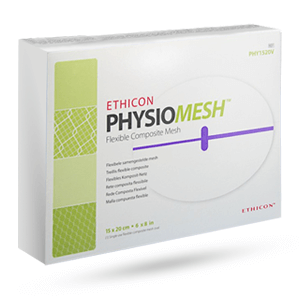Physiomesh Lawsuit Overview
 Ventral hernia repairs are among the most frequent elective surgeries performed in the U.S. Studies show that 63% of suture-only repairs result in hernia recurrence at the 10-year mark. In the mid-2000s, mesh hernia repair patches grew increasingly popular. Ethicon Physiomesh® Flexible Composite Mesh contains lightweight, flexible material that mimics muscle tissue. However, many Physiomesh patients subsequently suffered hernia recurrence and needed revision surgery. As a result, Ethicon issued a voluntary global market withdrawal for Physiomesh in May 2016. At least four injured patients filed a Physiomesh lawsuit in 2016, and more claims may soon follow.
Ventral hernia repairs are among the most frequent elective surgeries performed in the U.S. Studies show that 63% of suture-only repairs result in hernia recurrence at the 10-year mark. In the mid-2000s, mesh hernia repair patches grew increasingly popular. Ethicon Physiomesh® Flexible Composite Mesh contains lightweight, flexible material that mimics muscle tissue. However, many Physiomesh patients subsequently suffered hernia recurrence and needed revision surgery. As a result, Ethicon issued a voluntary global market withdrawal for Physiomesh in May 2016. At least four injured patients filed a Physiomesh lawsuit in 2016, and more claims may soon follow.
Whenever organs or tissue bulge through a weakness in the abdominal wall, it’s known as a ventral hernia. They’re among the most common abdominal surgery complications – 10-15% of laparotomy patients eventually develop ventral hernias. Weakened scar tissue around a healed surgical incision site can be vulnerable to ventral hernias. Getting your appendix removed or giving birth via Caesarean section are both risk factors, for example. In the U.S., at least half of all abdominal wall hernia repairs use surgical mesh to reinforce weakened muscle tissue. Six years after winning FDA approval in 2010, Ethicon pulled Physiomesh off the market due to high adverse event reports.
What Is Physiomesh?
Physiomesh is a mesh patch surgeons sew directly into abdominal wall tissue to repair ventral hernias. Filaments are woven into a patch, then given a sterile coating designed to prevent adhesion to the patient’s internal tissue. During ventral hernia repair, a surgeon pushes bulging internal organs or tissue back into place. Surgeons then suture any thin or torn spots along the abdominal wall shut. Finally, the surgeon sews a hernia mesh patch into place to reinforce weakened muscle tissue.
A 2016 study says 20% of Physiomesh patients report hernia recurrence within six months. Notably, hernia patients with Ventralight patches reported zero recurrences during that timeframe. That same year, two large, unpublished European Physiomesh studies revealed serious hernia recurrence and revision surgery risks. After initiating recalls in Europe and Australia, Ethicon issued an Urgent Field Safety Notice to U.S. surgeons in May.
Physiomesh Lawsuit Injury & Negligence Allegations
Matthew Huff filed the first Physiomesh lawsuit in April 2016. By December, injured patients filed at least four additional claims. Each claimant suffered serious or even life-threatening health complications within two years of hernia repair surgery. Every Physiomesh lawsuit accuses Ethicon of negligence and breach of warranty for knowingly marketing a dangerous device.
Plaintiffs also say that Physiomesh caused the following injuries:
- Bowel obstruction
- Intestinal fistula
- Abdominal abscess
- Chronic pain
- Severe infection
- Tissue adhesion
- Hernia recurrence
- Mesh fragmentation
- Organ perforation
The first Physiomesh lawsuit is now currently underway.
Check your eligibility for compensation.
If either you or a loved one suffered serious Ethicon Physiomesh hernia repair injuries, you may qualify for compensation from the manufacturer. Request your free case evaluation now to see if you may qualify.




